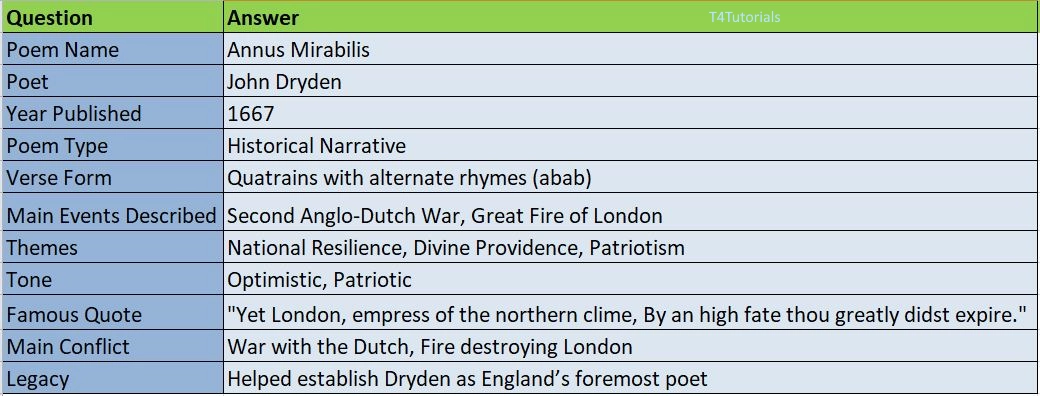Summary:
Annus Mirabilis (1667) is a historical poem by John Dryden that describes the events of the “Year of Miracles” (1666) in England. The poem recounts two major events: the Second Anglo-Dutch War and the Great Fire of London. Despite the devastation, Dryden presents an optimistic vision, portraying King Charles II as a heroic leader who will restore England’s glory. Written in quatrains with alternate rhymes (abab), the poem reflects Dryden’s patriotic and royalist sentiments, emphasizing resilience and divine providence.
MCQs:
- What does “Annus Mirabilis” mean?
a) The Year of Disaster
b) The Miraculous Year
c) The Year of War
d) The Golden Year
Answer: b) The Miraculous Year - Which two historical events does Annus Mirabilis describe?
a) The War of Roses and the Black Death
b) The Second Anglo-Dutch War and the Great Fire of London
c) The English Civil War and the Glorious Revolution
d) The Industrial Revolution and the French Revolution
Answer: b) The Second Anglo-Dutch War and the Great Fire of London - In which year was Annus Mirabilis published?
a) 1650
b) 1667
c) 1688
d) 1702
Answer: b) 1667 - Which English king does Dryden praise in the poem?
a) Charles I
b) Charles II
c) James II
d) William III
Answer: b) Charles II - What is the primary theme of the poem?
a) Romantic love
b) National resilience and divine providence
c) The downfall of monarchy
d) The beauty of nature
Answer: b) National resilience and divine providence - What is the verse form used in Annus Mirabilis?
a) Heroic couplets
b) Blank verse
c) Quatrains with alternate rhymes (abab)
d) Free verse
Answer: c) Quatrains with alternate rhymes (abab) - How does Dryden portray the Great Fire of London?
a) As a divine punishment
b) As an opportunity for rebirth and renewal
c) As a sign of the monarchy’s weakness
d) As a supernatural event
Answer: b) As an opportunity for rebirth and renewal - What role does the Second Anglo-Dutch War play in the poem?
a) It is used to criticize the English monarchy
b) It highlights England’s naval power and national strength
c) It is portrayed as a minor event
d) It is ignored in the poem
Answer: b) It highlights England’s naval power and national strength - What tone does Dryden adopt in Annus Mirabilis?
a) Satirical and mocking
b) Tragic and sorrowful
c) Patriotic and hopeful
d) Indifferent and neutral
Answer: c) Patriotic and hopeful - Why is Annus Mirabilis considered significant in Dryden’s career?
a) It established him as England’s leading poet
b) It was his only work in prose
c) It was banned by the monarchy
d) It was never published
Answer: a) It established him as England’s leading poet
| Question | Answer |
| Poem Name | Annus Mirabilis |
| Poet | John Dryden |
| Year Published | 1667 |
| Poem Type | Historical Narrative |
| Verse Form | Quatrains with alternate rhymes (abab) |
| Main Events Described | Second Anglo-Dutch War, Great Fire of London |
| Themes | National Resilience, Divine Providence, Patriotism |
| Tone | Optimistic, Patriotic |
| Famous Quote | “Yet London, empress of the northern clime, By an high fate thou greatly didst expire.” |
| Main Conflict | War with the Dutch, Fire destroying London |
| Legacy | Helped establish Dryden as England’s foremost poet |
